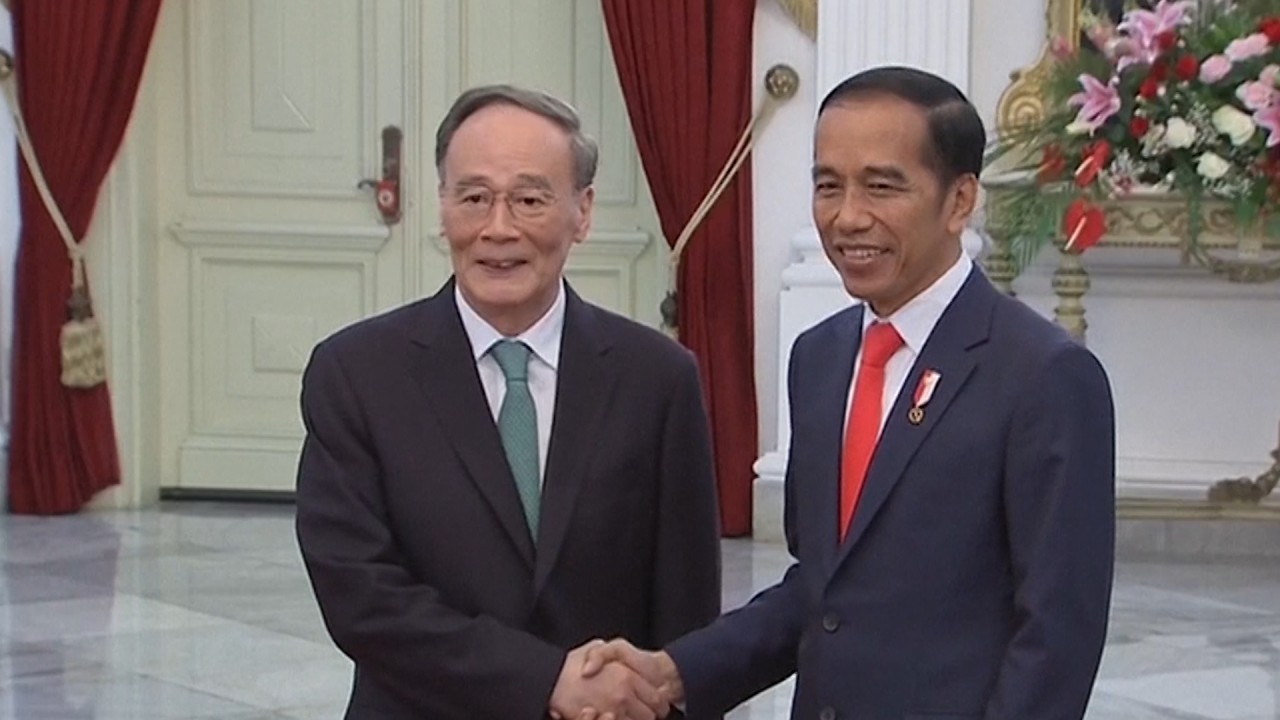
01:37
China eyes up investment opportunities as Indonesia makes plans to move its capital

“We must remain the subject who reserves the right to decide our own destiny and fight for our own goal, which is independence for the whole of Indonesia,” Mohammad Hatta, one of the Indonesian republic’s founding fathers, said during the country’s early years. With the US-Soviet Union Cold War kicking in, he advocated for a non-aligned foreign policy akin to “rowing between two reefs”.
Decades later, Hatta’s mantra of dynamic balancing between competing superpowers continues to guide Indonesian foreign policy. Under President Joko Widodo, known as Jokowi, Indonesia has nimbly pursed pragmatic “equidistant diplomacy” with both the US and China.
On one hand, Indonesia has deepened its economic interdependence with China, a major source of infrastructure investment and advanced technology. At the same time, it is rapidly fortifying defence and strategic cooperation with the US, with both countries recently launching a “strategic dialogue” and conducting their largest joint military drills in recent memory.
Indonesia, a cradle of the global Non-Aligned Movement, in many ways has stood as the ultimate expression of balancing between powers. But China’s rapid ascent and the threat of a Sino-American cold war are testing Indonesia’s strategic mettle and making pragmatic balancing increasingly difficult.
Since the restoration of bilateral ties in 1990, Sino-Indonesian relations have bloomed. Indonesia’s trade volume with China is triple that of its trade with US, while the number of Chinese tourists flocking to Indonesia in the pre-pandemic era exceeds that of any Western nation.
China’s investments in Indonesia increased 17-fold between 2007 and 2017, a dynamic that could intensify under China’s Belt and Road Initiative. Chinese companies, particularly Huawei, have helped modernise Indonesia’s telecommunications infrastructure.
There are also personal factors in play. Jokowi’s chief of staff, Luhut Binsar Panjaitan, has been a driving force behind increasingly close ties with China. As veteran Indonesian diplomat Dino Patti Djalal said, “Indonesia’s partnership with China is perhaps the most [economically] substantial compared to that with other countries.”
In contrast, bilateral relations with Washington have been, at times, testy throughout the past three decades. Under former strongman Suharto’s “New Order”, Jakarta maintained robust defence and intelligence ties with the US, which sought to keep Indonesia out of communist hands.
But Indonesia’s subsequent democratisation has strengthened the voices of conservative and Islamist groups, which have been critical of US policies across the Muslim world. Indonesia’s democratic leaders have come under increasing pressure to oppose Western policies, from the US-led invasion of Iraq and Afghanistan to the Trump administration’s recognition of Jerusalem as the capital of Israel.
Nevertheless, Indonesia has deftly maintained robust relations with both superpowers while consciously avoiding dependence on either. To begin with, Indonesia is determined to become an independent force in global affairs.
Home to almost 300 million people and boasting a trillion-dollar economy, it is a fully fledged middle power with even larger ambitions. Maintaining constructive relations with all major powers is critical to Indonesia’s long-term development and potential emergence as a new global power later this century.
Down the road, however, three major factors could complicate Indonesia’s equidistant diplomacy towards the superpowers, potentially even pushing Jakarta into Washington’s embrace.
First, China’s growing influence in Indonesia has rekindled ancient prejudices and xenophobic attitudes. Even during golden age of bilateral relations in the mid-20th century, former president Sukarno instituted anti-Chinese policies that eventually forced hundreds of thousands of Indonesians of Chinese descent to flee overseas, many to Maoist China.
Widespread reports of persecution of Muslim minorities in China have further intensified anti-Beijing sentiment, especially among the increasingly influential fundamentalist and nationalist groups in Indonesia. During the 2019 presidential elections, Jokowi’s rivals tried to discredit him by portraying him as a Chinese puppet who had not sufficiently stood up for the rights of Muslim Uygurs.
Meanwhile, more progressive groups have criticised the Jokowi administration for relaxing anti-corruption legislation to expedite China-funded projects. As in neighbouring countries such as Malaysia, big-ticket Chinese infrastructure projects have met widespread criticism for chronic delays, reliance on foreign workers and lack of transparency and compliance with good governance standards.
The biggest source of rising tensions between Indonesia and China, however, is the festering maritime dispute near the resource-rich Natuna Islands. Jakarta has been increasingly critical of China’s activities across the South China Sea, which has become a major regional security concern.
Jakarta’s toughening stance is partly because of the growing presence of Chinese fishermen and paramilitary forces within its exclusive economic zone. The “North Natuna Sea” overlaps with the southernmost tip of Beijing’s vaguely defined “nine-dashed-line” claims.
In response to China’s creeping presence, Jokowi visited the disputed islands last year. He declared that Jakarta’s sovereign rights were non-negotiable and instructed his generals to fortify the country’s military position in the area.
Aware of these growing anxieties over China, Washington has actively courted Jakarta. It has relaxed restrictions on joint military exercises with Indonesian special forces, expanded joint naval drills and promoted Indonesia as a major strategic partner and fellow democratic power.
It is unlikely, however, that this new era of US-Indonesian partnership will precipitate the end of Jakarta’s policy of “rowing between two reefs”. Much will still depend on whether China and Indonesia can manage their growing differences in favour of deeper economic interdependence in the years to come.
Richard Heydarian is a Manila-based academic and author of “Asia’s New Battlefield: US, China and the Struggle for the Western Pacific” and the forthcoming “Duterte’s Rise”